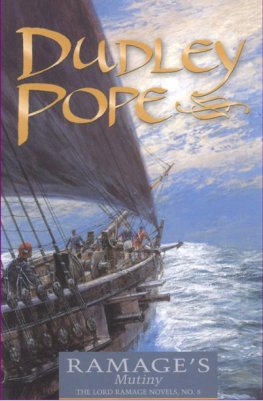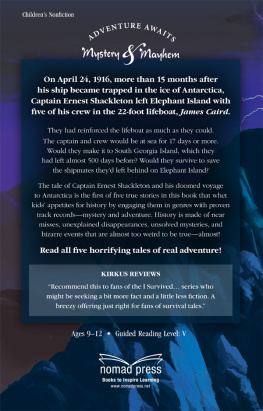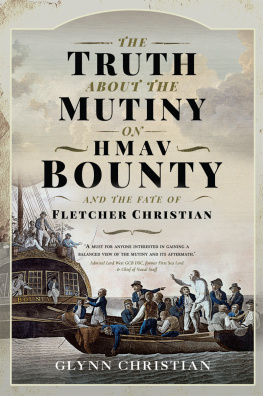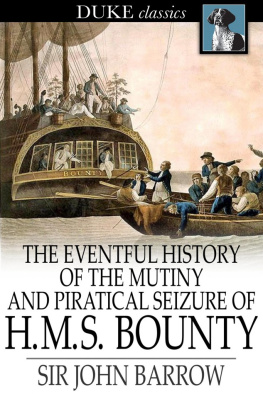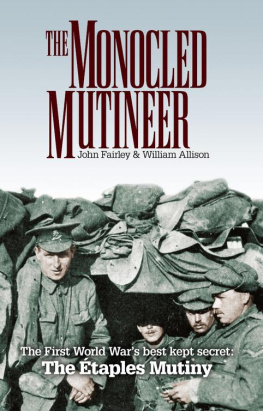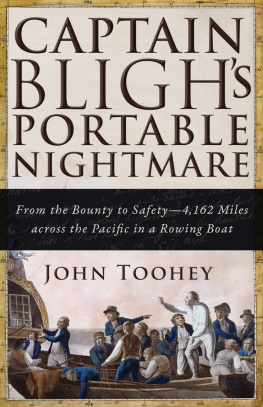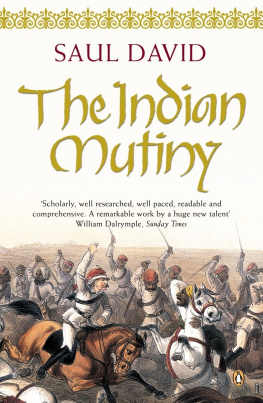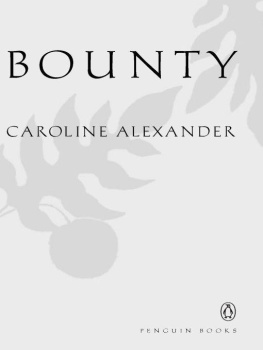To Owen Rutter. Over the last 230-odd years this incredible
story has had many enthusiasts gathering materials, doing
research, trying to work out exactly what happened.
None, however, were more dedicated, tenacious or
infectiously obsessed than the English historian Owen
Rutter and a hundred years later, I salute his work.
There
Glynn Christian, author of Fragile Paradise,
direct descendant of Fletcher Christian
Awake, Bold Bligh! The foe is at the gate! Awake Bold Bligh! Alas! it is too late!
Lord Byron, The Island
I t was at a fabulous 60th birthday party in Melbourne, a couple of years ago. Our hostess had placed Lisa and me next to the wonderful acting couple, Sigrid Thornton and Tom Burstall. Over the entre, Tom raised the story that had long fascinated him, the one he had been gathering material on for 20 years, and had long thought could be the perfect film Mutiny on the Bounty. He was insisting it was the perfect book for me, a killer story, which had not yet been done in the fashion I do my historical stuff, making it live and breathe like a novel, but backing it with footnoted fact.
I knew very little about it not much more than Fletcher Christian rising against Captain William Bligh, before the former reached Pitcairn Island, and the latter returned to England and was half-interested, at first. But as Tom continued to paint a picture, the contours of the tale, the staggering sexual freedoms of Tahiti, the brilliance of Bligh as a navigator, his bastardry as a Captain, his amazing feat of endurance after the Mutiny occurred; the courage of Fletcher Christian, his extraordinary fate; the division of the Bounty crew, first into Mutineers and Loyalists; then the division of the Mutineers into Blacks and Whites, and then most fascinatingly of all, women and men I listened ever more intently.
What do you think? he asked when he had finished.
I was both stunned, and sceptical, but didnt know him well enough to express the last part.
Quietly, privately, I couldnt believe the story could be as good as he said. I had always said that the best story in the history of the world was the shipwreck of the Batavia, and noted how sad I was when I finished writing it, because I knew Id never work on a better one. But the history Tom had just recounted had even more the twists, the turns, the agony, the ecstasy, the endurance, the hatred and love and lots of situations where the eternal question occurs: what would I do in that situation?
But could it possibly all be true, and actually backed up by the kind of original documentation Id need to believe it was true, to give it the fine detail and dialogue I always cherish most, to make my version of history truly come alive?
A quick cruise trawling the internet later that night gave me the preliminary view it was true! It was all there. Tom and I corresponded thereafter. He sent me some documents he had collected, I put one of my researchers, my cousin Angus FitzSimons, onto pursuing all the diaries, logs, letters, testimony and transcripts that surrounded the saga. Angus worked hard for three months, getting his head around the whole thing, working out where all the documents were, how they could best be accessed, what had already been done in the field, where we could strike new paths.
When he was finished, we had lunch, which I had scheduled for two hours or so. Four hours later, after I had filled both sides of 15 serviettes and one menu with notes, we got up from the table, and I went home and told Lisa that I had just heard the new best story in the history of the world, that this was an important day.
A year later, here we are!
As ever, and as I always recount at the beginning of my historical work, I have tried to bring the story part of this history alive, by putting it in the present tense, and constructing it in the manner of a novel, albeit with 1500 footnotes, give or take, as the pinpoints on which the story rests. For the sake of the storytelling, I have put the whole account in strong, though not strict, chronological order of events, and I have occasionally created a direct quote from reported speech in a journal, diary or letter, and changed pronouns and tenses to put that reported speech in the present tense. When the story required generic dialogue as in the things a Captain of that time would say when weighing anchor I have taken the liberty of using that dialogue to help bring the story to life. Equally, every now and then I have assumed generic emotions where it is obvious, even though that emotion is not necessarily recorded in the diary entries, letters, etc.
Always, my goal has been to surmise what were the words used, based on the primary documentary evidence presented, and what the feel of the situation was. For the same reason of remaining faithful to the language of the day, I have stayed with the imperial system of measurement and used the contemporary spelling, with only the odd exception where it would create too much confusion otherwise. I also note the obvious, that in the eighteenth century displaying a consistency in spelling, particularly with place names and foreign words, was clearly so low on the priority list no-one was remotely fussed. This means that the primary documents have a wide array of different spellings, sometimes from the same person. I have broadly restored consistency, while mostly going with the way Captain Bligh spelt things. In the spirit of depicting the vernacular and thinking of the day, the sailors terms for Polynesian and Indigenous people Natives, Indians, or Blacks have been retained, for the sake of authenticity. And while, at the time, Tahiti was sometimes referred to as Otaheite, I have made it Tahiti throughout, for the sake of consistency.
All books used are listed in the Bibliography, but here I cite most particularly the words recounted by those who lived through the events: James Morrison, William Bligh, Jenny the Tahitian Native, Alec Smith and Peter Heywood. In the modern era, I especially enjoyed the book on Bligh by Rob Mundle while disagreeing with his fundamental conclusion on Bligh as a leader of men and also Diana Prestons book, Paradise in Chains.
My deepest debt, however as it is for just about anyone of the modern day who writes about the Mutiny is to the scholar, writer and editor Owen Rutter who, in the 1930s, produced volume after volume of carefully transcribed and collated documents, trial transcripts, diaries, letters and logs of Bountiana as he put it. Thanks to him we have access to the unfiltered voices of the Bounty court martial, the complete stories of James Morrison, John Fryer and especially William Bligh. To indicate the infectious level of his enthusiasm on that maddening man Bligh, I can do no better than to quote his own words, introducing his final volume of Blighs logs and letters: Probing Funny he should say that. For I, too, feel like I know Bligh, and can only hope the reader experiences many such moments before they lay this book down.
I must also thank that Aladdins cave of Bountyia, the Mitchell Library in Sydney. The Mitchell Library is a national treasure, a place of calm and diligence, a public institution that restores your faith in public institutions. You fill in your request slip for some arcane ancient magazine or incredibly rare, incredibly expensive volume of memoirs, and 45 minutes later, there it is, sitting waiting for you in the collection dock.
To give just one example, William Bligh wrote a Log after the Bounty mutiny, a Log full of complaints, arguments, drawn swords and (spoiler alert) further mutinies. This Log was never published by Bligh, there is not any copy of it in the Admiralty records in London, so where is it? The Mitchell Library. Blighs grandchildren donated it in 1902 and there it sat, waiting for its amazing story to be discovered by researchers like Owen Rutter in the 1930s, who could scarcely believe these scandalous, wonderful records still existed. And they still do, thanks to the Mitchell Library.
Next page

